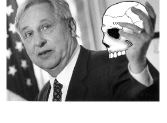To run or not to run: that is the question faced by Mayor Paul Schell.
Seattle’s chief executive says he’ll decide early next year whether he wants to contend for a second term in City Hall. And, despite some rough first-term moments, many political observers think Schell will be back for more.
He has managed some significant accomplishments on the plus side of the ledger. His administration went three-for-three on major ballot issues to fix up the city’s parks, libraries, and community centers. He’s also hewed to his pro-growth platform of three years ago, resulting in a city in which construction cranes dominate the skyline.
The black eye inflicted by the botched policing of last year’s World Trade Organization conference protests has been soothed somewhat by the departure of unpopular police chief Norm Stamper. The anti-WTO crowd even provided Schell with a huge unintended boost with last month’s N30 reenactment/ anniversary party—this time around, the cops had the guns and the numbers. Order was preserved. And, best of all, the whole thing was on live TV.
Schell does have a rival. King County Council member Greg Nickels, who came within a few thousand votes of surviving the 1997 mayoral primary, got in the race early and showed off his fund-raising skills (he’s got $47,782 in the bank). But, after a round of positive press, Nickels’ mayoral run got pushed out of the headlines by the presidential election and Florida’s vote-counting follies.
If Schell does run for reelection, expect a small field. Both he and Nickels are reasonable bets to survive the primary, leaving room for just one more major candidate. Also, several hopefuls have said they won’t enter the race if the mayor runs for reelection.
Here are the other possible contenders in alphabetical order:
*Ken Alhadeff. If lusting publicly after the mayor’s office was all you had to do to get in, he’d be serving his third term right now. This local businessman also brings a large personal fortune and a fine r鳵m頯f civic good deeds. Upside: Built nice movie theater in Ballard. Downside: More youthful indiscretions than George W.
*Frank Chopp. The co-speaker of the state House of Representatives is the undisputed top dog in the city’s so-so Olympia delegation. Upside: Could easily survive a Schell-less primary election. Downside: A long shot to run, as his interests run more to state issues such as education funding and social services.
*Jim Compton. The onetime TV commentator has just two years on the City Council, but an open-seat race for mayor could prove just enticing enough to get him back on the campaign trail. Upside: A familiar face and name. Downside: Would get stumped by this question: “Why do you want to be mayor?”
*Brian Derdowski. The former King County Council member would have to move in town from the Eastside to make a run, but he’s raring for a good fight. Upside: As one of the few politicians on the streets during the WTO protests last year, could have the full backing of the fair trade gang. Downside: Look what such support did for Ralph Nader.
*Jan Drago. The council Budget Committee chairperson isn’t likely to challenge Schell but would be a good bet to enter an open race. Upside: Should inherit much of Schell’s downtown financial support. Downside: Would get lost in a large field.
*Jenny Durkan. A noted lawyer from a prominent local political family, she’s served on Schell’s blue-ribbon committee to review police policies (good) and was former council member John Manning’s defense lawyer in his spousal assault case (not so good). Upside: Has the necessary Democratic Party chits and good establishment connections. Downside: Who is she again?
*Deborah Senn. Yes, Deborah Senn. The former Washington insurance commissioner just ran a statewide race (albeit very poorly), lives in Seattle, and has lots of free time. Upside: Should retain the outstanding labor support from her US Senate run. Downside: Still possesses the most grating speaking voice in Washington politics.
*Peter Steinbrueck. This Seattle City Council member has stood for election twice in the last four years and won by huge margins. Upside: Could be the city’s first activist mayor in two decades. Downside: Needs another four years of public speaking classes.
Back for more
Matthew Fox is once again roaming the halls of the City Council’s private offices.
Don’t worry. The fiery University District activist, whose arrival at City Hall as an aide to ex-council member Charlie Chong panicked the floor just three years ago, is only back for a month this time. He’s working as a temporary employee for council member Nick Licata, contacting business and citizen groups in the neighborhoods potentially affected by a proposed West Seattle-to-Ballard monorail line.
No word yet about whether the other council offices are locking their file cabinets.
He loves to dream
Spacey Seattle Times columnist Mark Trahant has left the paper due to strike-related angst.
However, Times officials now say speculation that Trahant was the prime candidate to replace retiring editorial page editor Mindy Cameron was inaccurate. Cameron, who now plans to delay her retirement until the ongoing newspaper strike is settled, says Trahant was interested in the job but was no longer a candidate at the time he submitted his long resignation letter (posted on the Poynter journalism Web site).
In the letter, Trahant decries the damage done to the newspaper by the strike but cites his father’s past union involvement as keeping him from crossing the picket line. True to form, Mark doesn’t get around to making his point until the ninth paragraph.






